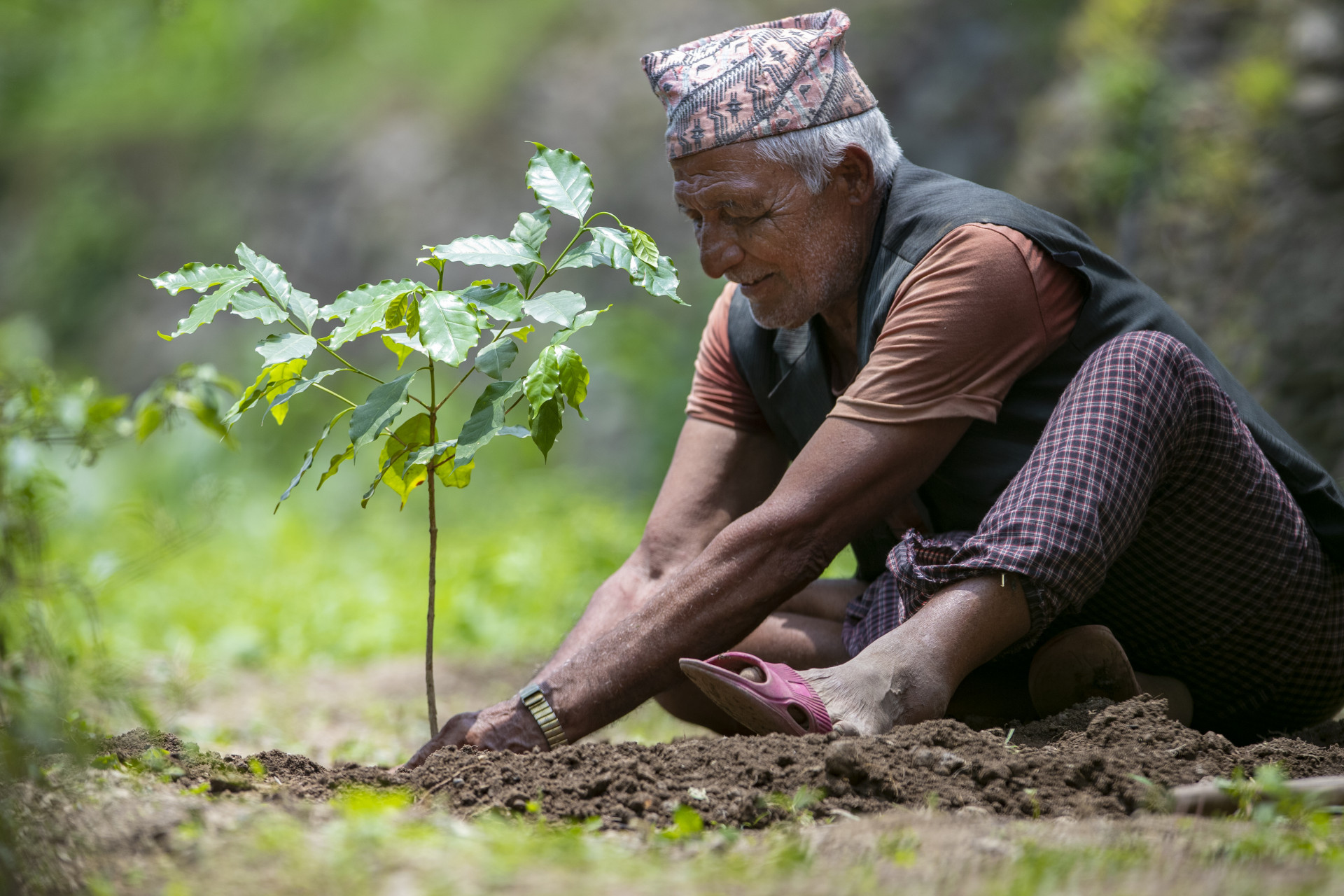The Sustainable Agriculture Promotion (SAP) coffee farm sits 1,100–1,300m ASL in Chaurideurali-8 Kavre, Bagmati province. Below us in the valley, the Sunkoshi River runs all the way from Tibet and Nepal through to India.
Our specialty Arabica coffee is grown where the view is clear, the skies blue, and beneath us is the mighty Sunkoshi. It is a joy to climb the coffee hills listening to birds chirping and seeing the ripple of the sun. Every day is different from thunderstorms to quiet sunrises. Butterflies flit amongst the heady aroma of wildflowers.
We harvest a wonderful mixture of yellow and red Bourbon and Caturra cherries against the backdrop of Nepal’s awe inspiring 7,134m high Mt Gaurishankar. It is known as the Goddess of Gauri, a sacred mountain. Its majesty is unchallenged; it remains unclimbed to the top.
On clear days, we have splendid views of the Himalayan mountains. Our lands are an important and valuable biodiversity hotspot for plants and animals. Great diversity creates unique coffee with high sweetness, medium acidity, complex, sweet, fruity flavours, and a well-balanced, long aftertaste.
Our goal and mission are to increase the output and productivity of our farm, and support our farmers who are poor and financially insecure. They lack resources and knowledge of good agricultural practices (GAP) in organic coffee farming, and disease and pest control, so we train them free of charge.
We have 10 growers, including five women and two youth, with 200–500 Arabica plants. Most are older, 40–50 years, with families to feed, and schooling and healthcare bills. Women work on coffee farms too and support their husbands.
SAP Company is very thankful for our community of organic coffee growers, and everyone who is involved directly and indirectly in the Nepal coffee sector.
"
Not only do I love what I do but our farm is surrounded by immense beauty. I enjoy photographing our “a coffee with a view".
Adrina Sedhai, Co-Founder, SAP Coffee
We work with 20 smallholder farmers with less than half a hectare each from districts including Lamjung, Ilam, Kavre, and Sindhupalchowk. We are proud to work with different cultural groups in the Hills areas, such as the Tamang, Dalit, Brahmin, Magar, and Newar peoples.
Each area is unique from the far western Ilam in Province 1, to Lamjung in the western region. Lamjung is often referred to as mid-hills, spanning the tropical to trans-Himalayan geo-ecological belts. The coffee fields have breathtaking views of the Himalayas with incredible sunrises and the snow-capped peaks of Machapuchare and Annapurna.
We source half a ton of beautiful, hand-picked cherries. Farmers intercrop coffee with fruit and citrus plants, legume crops and spices, such as ginger. Some farmers grow oilseed crops like mustard and sesame.
We also grow rosemary, white tea, and green tea alongside our coffee. We sell freshly cut rosemary in 100g–1kg amounts, or dried rosemary to restaurants and organic supermarkets.
In winter, plants are irrigated at 1–2 weeks’ interval depending on moisture availability but in monsoon, rainfall is adequate for moisture retention. Mulching is done along with weeding.
We use compost manure, farmyard manure (FYM), cow urine foliar spray, jholmal (a homemade bio-fertiliser and bio-pesticide), wood ash, and bone meal.
We apply Bordeaux mixture paste and foliar spray to control leaf rust disease. Yellow sticky traps are used for aphids, whiteflies, and adult leaf miners. We prune or uproot plants affected by stem borers and burn them. We also have an integrated pest management strategy.
We have planted coffee here for over seven years while researching its taste and quality. We have trialled non-chemical inputs based on scientific and traditional knowledge and are now able to produce quality coffee grown with organic practices.
Our farm has a sandy to loamy soil range with humus containing forest soils, and a subtropical climate zone of 1,100–1,300m ASL.
Crop diversification is important on our farm. Our shade-grown specialty Arabica is protected by avocado and macadamia trees. These provide an extra income source and resilience in our business and protect the coffee from frost and cold.
We also grow medicinal plants, fruit and food crops including kagati (lime), avocado, tej patta (bay leaf), kalki (bottlebrush), macadamia nut, rosemary, lapsi (Nepali hog plum), Timur pepper, tite pati (mug-wort), holy basil, aloe vera, stinging nettle, and more. These plants are used as anti-repellents against different insects and pests, and for traditional medicines.
Our coffee garden is bird friendly with a fully organic base and no pesticides. Our farm is grounded in the ethos of organic coffee farming for the export market.
We hold an organic Internal Control System (ICS) group certification. We may gain organic certification in future to meet international demand. However, now, and for the local market, it is not cost efficient.
